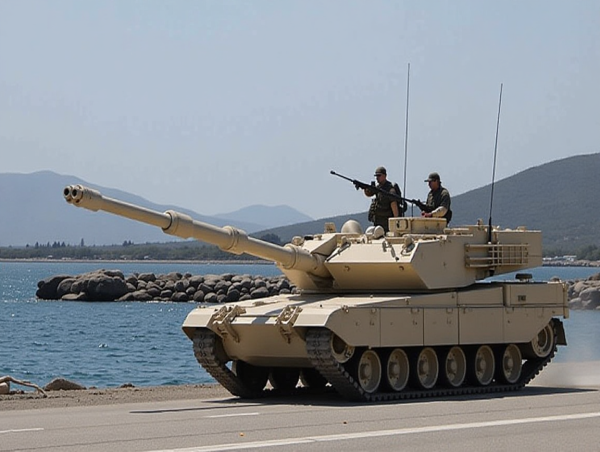Greece is once again among the top NATO defence spenders, with fresh data showing the Mediterranean nation allocated 3.1% of its GDP to military expenditure in 2024.
Only four NATO members spent a greater share of their national output on defence: the US, Poland, Latvia, and Estonia.
While these figures reflect broader regional anxieties over Russia’s actions in Ukraine, Greece’s motivations are more complex — rooted in a long-standing and unresolved rivalry with Turkey.
The country’s outsized defence budget plays a crucial geopolitical role, both in securing its regional interests and in boosting its influence within NATO.
As the alliance looks to raise its target to 5% of GDP, Greece finds itself in a unique position: already near the top, yet struggling to translate spending into full-spectrum military readiness.
Turkey rivalry drives high defence allocation
Greece’s persistent tensions with Turkey are central to its sustained military investment.
The two nations, despite both being NATO allies, have a legacy of conflicts including territorial disputes over Cyprus, maritime boundaries, and the sovereignty of numerous Aegean islands.
These islands — many of which lie just a few kilometres off the Turkish coast — are heavily garrisoned by Greek forces.
According to NATO estimates, these strategic deployments significantly inflate Greece’s defence bill.
Each island requires its own troop presence, logistical support, and military infrastructure.
The resulting cost is high, but Athens views it as necessary to preserve sovereignty and prepare for any potential regional threat.
Greece’s defence posture is further influenced by instability in nearby regions such as the Middle East and North Africa, as well as Turkey’s recent assertiveness in the Eastern Mediterranean.
Analysts note that Athens is positioning itself to remain militarily responsive across a range of possible scenarios.
Heavy foreign procurement limits self-reliance
Despite the large allocation of funds, Greece’s defence sector faces structural limitations.
Much of the recent spending has been directed abroad — primarily to purchase advanced weapons systems from countries like the US and France.
This strategy has helped improve bilateral ties, but has also reinforced Greece’s dependence on foreign suppliers.
Efforts to build a robust domestic arms industry have lagged behind.
As a result, key gaps remain in Greece’s ability to produce and maintain critical defence technologies on its own.
Experts say developing an indigenous industrial base is now a priority for Athens if it wants to sustain its military capabilities and reduce long-term costs.
The country’s land forces also face modernisation challenges.
Greece maintains a large fleet of tanks, but many are dated and operated in small, scattered units across the islands.
Training limitations and logistical hurdles further constrain the effectiveness of these assets in a coordinated military response.
NATO aims for 5% target, but Greece may hold steady
NATO members are currently reviewing a proposal to raise their collective defence spending target to 5% of GDP.
The breakdown includes 3.5% for traditional military purposes and 1.5% for infrastructure and cybersecurity.
While this marks a significant jump for most countries, Greece is already spending over 3% and is closer to the target than most of its peers.
Still, analysts caution that Athens may not drastically increase its defence budget in response to the proposed target.
The primary security threats facing Greece are distinct from those driving spending increases in countries closer to Russia.
Greece’s military strategy remains focused on maintaining regional deterrence rather than preparing for large-scale conventional conflict.
Strategic spending enhances influence within NATO
Greece’s high defence spending does offer one clear benefit: greater diplomatic leverage within NATO.
By exceeding the alliance’s long-standing 2% benchmark, Athens strengthens its position in internal discussions and deepens cooperation with major suppliers like the US and France.
Officials suggest that this enhanced status helps Greece secure more favourable defence arrangements and reinforce its security guarantees.
As NATO expands and adapts to new threats, Greece is likely to remain an important, if regionally focused, member of the alliance’s evolving military landscape.
The post Greece tops NATO defence spenders as Turkey tensions drive strategic push appeared first on Invezz





